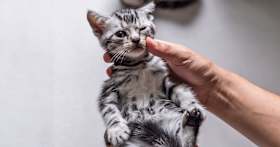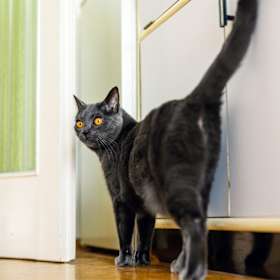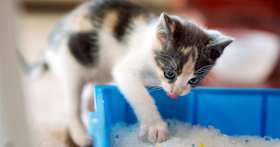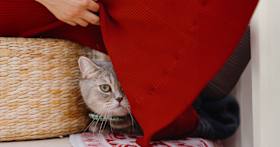Kitten Constipation: Why Hasn’t My New Kitten Pooped Yet?
From diet to health concerns, here’s a guide to how to know for sure, what may be causing this issue in your cat, as well as some potential treatments for it.
From diet to health concerns, here’s a guide to how to know for sure, what may be causing this issue in your cat, as well as some potential treatments for it.
by Adrienne A. Kruzer, BBA, RVT, LVT, | August 20, 2024

ysbrandcosijn / iStock
Part of being a conscientious new pet parent to a kitten, is making sure they’re, you know, doing their business. That’s right: Pooping can be an important indicator of their well-being. Kitten constipation can be caused by various factors, including dietary issues, dehydration, or underlying health problems. Here’s a guide to better understanding the signs and solutions to help your stopped-up kitty.
Understanding the root cause is crucial for providing appropriate treatment, as prolonged constipation can lead to more serious health complications. It starts with regularly monitoring your kitten’s litter box habits, which will help you recognize constipation. If that’s the case, your veterinarian can help diagnose, treat, and hopefully prevent the issue from happening again. (At this point, your very relieved kitten would thank you if they could.)
Ignoring the issue is not only uncomfortable for your kitten, but can also allow the underlying problem causing the constipation to exacerbate — and no one wants that.
In an otherwise healthy cat, simply not getting enough water from the diet can cause constipation. But it can also be a symptom of more serious health problems, such as bowel obstructions (caused by your cat eating fur or other non-food items), tumors in or near the intestines, abnormally narrow intestines, an imbalance of electrolytes, neuromuscular diseases, stress, anxiety, and even side effects from medications. Determining the cause of a cat’s constipation (whenever possible) is important in deciding your cat’s best treatment.
Since cats use litter boxes, monitoring them for signs of constipation is easy if you know what to look for. Common signs of constipation in cats can also be an indication of another problem, so if your cat has any of the following cat-constipation symptoms, be sure to seek veterinary attention.
Pooping should not be difficult or painful, so if your cat is straining or vocalizing while in the litter box, this may be a sign they are constipated. If you see your cat straining or hear them crying, be sure to check that they aren’t having any issues peeing. A kitten having trouble pooping may indicate constipation — a condition that is not immediately life-threatening — but a cat who is straining to pee indicates a urinary blockage, which is an emergency.
Constipated cat symptoms include both the lack of poop and hard poop. If all the feces in the litter box, even the fresh ones, are hard — or if you don’t see any in the litter box — your cat is probably constipated.
In addition to straining to poop, your kitten may have belly pain if they are constipated. You may be able to tell that your kitten has abdominal pain if you pick them up and they try to get away, hiss, or cry out. They also may not want you to pet their belly. Abdominal pain can indicate constipation or other serious issues, so you should never ignore this symptom.
While veterinary attention should be sought out for a constipated cat, there may be some things you can do at home to help your cat before that vet appointment. Whether or not these cat constipation remedies will be enough to fix your cat’s problem will depend on the severity and underlying reason for the constipation.
A commonly recommended home remedy for cat constipation is to make a dietary adjustment. Constipation can be caused by an inadequate amount of water in your cat’s diet. So if they regularly eat dry kibble, switch to wet or moist cat food to add moisture to their diet. Cat food that comes in cans or pouches naturally contains more water than dry kibble.
In addition to increasing the water your cat consumes in their regular diet, encouraging your cat to drink more water can help keep them hydrated — and therefore help with constipation. Cat drinking fountains or ice cubes will entice your kitty to drink, since cats are more likely to drink running water or cold water than still or warm water.
Olive oil is sometimes used in an attempt to help cats with constipation. It is unknown exactly how effective this home remedy is, but a very small amount of olive oil in your cat’s food won’t hurt them. (However, you should not force any type of oil into your cat’s mouth, since it can accidentally be inhaled.) This remedy should not be used regularly, as too much fat in your cat’s diet can lead to serious health problems.
Canned pumpkin puree may help with your cat’s constipation. About half a teaspoon is all you need to give your cat the water and fiber benefits they need. And make sure you’re giving them pure pumpkin puree which differs from pumpkin pie filling: Because pumpkin pie filling contains a variety of spices, which can be toxic to them.
Psyllium, guar gum, and other fiber supplements may improve poop consistency when added to your cat’s diet. Powders, capsules, and fiber-enriched foods can be purchased to help your constipated cat have normal poops.
Sometimes a gentle belly massage and a little exercise will help move things along in your constipated cat’s belly. Regular exercise will help promote normal gut movement, but if your cat is less than willing to move around when they are constipated, a belly massage may be beneficial. If you’re wondering how to stimulate a kitten to poop, gently wiping their hind end with a wet cloth may mimic a mother cat licking them and help them to poop.
If your cat is in pain, not eating, vomiting, lethargic, not pooping, or simply acting abnormally, you should seek veterinary care. Cats are very good at hiding their pain and discomfort, so by the time you see obvious signs of illness, they are probably really sick. Being an observant pet parent can help you catch the signs of constipation in your cat early and get them the help they need as soon as possible. Treatment plans may consist of prescription medications, over-the-counter medications, various home remedies, or a combination of things.
How to treat constipation in cats will depend on the reason why your cat is constipated. Once the root cause is determined, your vet can recommend an appropriate treatment plan.
In addition to home remedies, other over-the-counter remedies may be recommended by your veterinarian. Various laxatives that contain petroleum jelly or polyethylene glycol 3350 are most commonly used in cats with constipation, but which one you use will depend on the underlying health issue.
Some medications to treat your constipated cat require prescriptions. These may include IV fluid injections administered in-clinic to correct dehydration, medications called prokinetics that help move food through the digestive system, and/or pain medication to help make your cat more comfortable.
Sometimes constipated cats require extra assistance in passing their poop. Enemas provide that extra help. But if your cat won’t allow an enema while they are awake, sedation will be necessary to administer the hind-end treatment.
If your cat is diagnosed with a disease that results in chronic constipation issues, surgery may unfortunately be necessary to remove part of the colon. This will typically only occur in severe and unresponsive constipation cases that have a neuromuscular or unknown cause.
Yes, stress can play a role in constipation in kittens. Stress may cause a kitten to hide and not want to use their litter box, causing constipation over time. There are also unknown reasons why cats get constipated, so stress may play a larger role in constipation than is currently known. It’s always best to try to prevent as much stress as possible in your cat’s life.
While each kitten may have a different schedule, they should poop at least once a day. Some kittens poop several times a day, but as they get older, they may only poop once a day or once every other day. If your kitten hasn’t pooped for more than two days, there may be something wrong, so you should contact your veterinarian. Depending on whether or not your kitten is showing signs of pain, they may recommend you try some home remedies before bringing them in for an exam.
Feline Health Topics: Constipation
Gastrointestinal Prokinetic Drugs Used in Monogastric Animals

Adrienne Kruzer is an accomplished veterinary technician and writer with over 15 years of hands-on experience caring for domestic and exotic animals.

Adoption Advice

Behavior & Training

Shelters & Rescue

Behavior & Training
Is your cat spraying? Read more to learn the why cats spray and effective methods to stop this behavior.

Behavior & Training

Behavior & Training
Is your cat refusing to use their litter box? Explore these tactics to address and resolve this issue.

Adoption Advice
Bringing home a cat? Here’s what you’ll wish you knew sooner.

Adoption Advice
By creating a safe space, respecting your cat’s boundaries, and using positive reinforcement, a shy cat can absolutely thrive in your home.